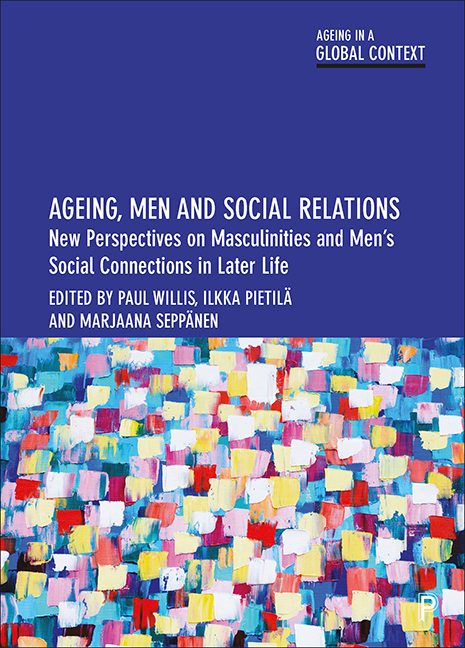 Ageing, Men and Social Relations
Ageing, Men and Social Relations Published online by Cambridge University Press: 18 January 2024
Introduction
Erasure of older people’s expressions of sexuality by society is one of many stigmas experienced by aged individuals. However, with slow steps the myth of asexual old age is giving way to discussions about older people’s sexuality, and how the scenario of an active sexual life in older age unfolds and can be influenced by the use of medical technologies (to maintain sexual vigour) or social technologies (to find new partners) (Lochlainn and Kenny, 2013).
Even if the very concepts of sexuality and ageing have undergone changes in the last 20 years (Orimo and Kamiya, 2008), this revolution took place at a ‘global’ scale so much more guided by the Global North, being irregular in other geopolitical and social contexts. In Latin America, in a generalised manner, it still resists discussions about sexuality in formal contexts and some important social structures, such as families, schools, religious centres and healthcare settings (Abdo, 2020). The training of health professionals still faces internal conflicts between the adaptation of local cultures and values and import of international scientific evidence, so that, for many professionals, these social changes do not reflect in their clinical practice, thus reinforcing health services as spaces that maintain social control especially regarding sexuality (Jakubec and Bearskin, 2020). Thus, the study and understanding of older people’s sexuality, in the Latin American, dynamic and technological setting, is still underexplored and is a challenge for local and international researchers, mainly when it comes to non-heterosexual sexualities.
In Latin America, especially in Brazil, homosexual relationships, often marked by significant complacent hedonism associated with the overvaluation of physical attributes capable of provoking attraction and desire (Simões, 2011), are continually modulated by the convergence of sociopolitical advances. This allows them a freer and safer expression of their affectivity, but also by technological advances, which provide them with a greater layer of protection against violence and social judgements and which, currently, affect everyone’s relationship dynamics, regardless of their sexual orientation. A number of studies conducted with Brazilian older adults point out that these advances affect older people in a very particular way, as they allow them (many for the first time) to experience their sexuality in a free way, although issues related to vulnerability to diseases, abandonment and loneliness are still present and significant in this population (Santos and Araújo, 2020; Pereira, 2022).
To save this book to your Kindle, first ensure [email protected] is added to your Approved Personal Document E-mail List under your Personal Document Settings on the Manage Your Content and Devices page of your Amazon account. Then enter the ‘name’ part of your Kindle email address below. Find out more about saving to your Kindle.
Note you can select to save to either the @free.kindle.com or @kindle.com variations. ‘@free.kindle.com’ emails are free but can only be saved to your device when it is connected to wi-fi. ‘@kindle.com’ emails can be delivered even when you are not connected to wi-fi, but note that service fees apply.
Find out more about the Kindle Personal Document Service.
To save content items to your account, please confirm that you agree to abide by our usage policies. If this is the first time you use this feature, you will be asked to authorise Cambridge Core to connect with your account. Find out more about saving content to Dropbox.
To save content items to your account, please confirm that you agree to abide by our usage policies. If this is the first time you use this feature, you will be asked to authorise Cambridge Core to connect with your account. Find out more about saving content to Google Drive.